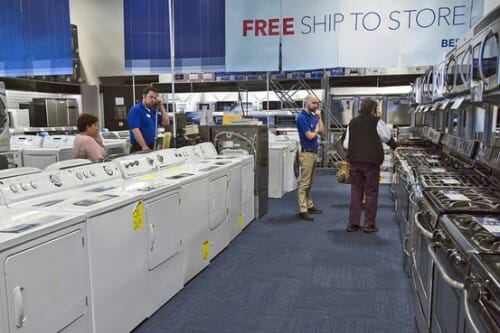I HATE most new loyalty programs at stores. When loyalty programs really came in vogue with airlines, they made sense. Airlines gave their best customers bonuses for spending lots of money with them. Today, though, every store I go into has a loyalty program. I have a Fry's card, an Albertson's card, and a Safeway card (grocery stores); I have a Borders and a Barnes and Noble card; I have an Ace Hardware card and a Best Buy card; For god sakes, I have a TGI Friday's card. Not to mention the cards from American, America West, Southwest, Hilton, Hyatt, Marriott, National, Hertz and probably 20 others I can't remember off-hand. I carry a stack of the travel related ones in a big rubber band in the bottom of my briefcase. The rest bulge my wallet up to about an inch thick, even when it is (all too often) devoid of cash.
Did I mention I hate all these programs? Most of them have no real reward for purchase volume, you just have to have their card in your pocket to qualify for the best deal. What is the point of this --its not like they are rewarding purchase volume (in fact, grocery stores do just the opposite, by rewarding the people who buy the least with better service via the express lane). Why do I need to fatten up my wallet to unmanageable proportions just to get a store's best price?
This analogy will date me, but its kind of like all those women who used to carry eggs and live chickens in their purses on Let's Make a Deal in the hopes that Monty Hall will ask for that item to qualify for some prize. When I check out in the grocery store, they even put little asterisks by certain items to remind me that I am not getting their best price because I have not shown them their plastic card. Come to think of it, my Monty Hall analogy may be flawed. It is more like the pagan gods refusing to provide rain until their hapless subjects had sacrificed the right kind of goat. Now how would that be for a loyalty program -- "I am sorry Mr. Meyer, but you sacrificed a goat, and Best Buy requires that you sacrifice an ox to get 10% off that DVD player".
Well, the revolt (or, if you accept the pagan religion analogy, the reformation) begins today. I chucked everything in a drawer except the travel cards. The book store cards are easy - its Amazon all the way now. I used to drop in and buy some impulse items at my local Borders, but with free 2-day shipping for the rest of the year at Amazon (I signed up for the offer) there is no reason to buy anywhere else. Amazon always gives me their best price without a piece of plastic in my pocket or an animal sacrifice and I don't have to deal with that irritating reminder from the cashier at Borders that without their card, I'm not going to get their best price.
Time will tell whether I can live with the increased grocery prices that will come from not having their card, but I am going to give it a shot on principle. The revolt begins -- anyone want to join me?
PS - should I name this effort my loyalty pogrom?
UPDATE: Thanks David, I fixed "principle".
UPDATE #2: Per the comments, I do indeed understand that one of the major goals of well-structured loyalty programs is to gather data about the customer. However, I would argue that out of 100 companies gathering customer purchase data, maybe 3 know what they are doing with it - meaning that they do more than just make nice powerpoint slides for the bosses with the data.
Take an example of my grocery store, Fry's. Fry's has a loyalty card you must present at the register to get the best pricing. Once you present the card, the checkout person will tell you at the end of the transaction how much you saved by using the card. But half the time the people around me forget their cards, and the checkout person asks other people in line to lend their card, so the hapless customer who forgot theirs can still get the better pricing. In other words, if the data is really being used, it is corrupted.
But how do they use the data? Certainly bricks and mortar stores have limited options - they can't do like Amazon does and present me with a custom selection of goods when I first walk into the store. They might send me a customized coupon package, but I have found no evidence that any loyalty program I have used has ever done this. My guess is that most of the data just feeds the voracious appetite of the bosses to see data. At best, the data might be used in vendor negotiations, but I doubt this too.
By the way, to provide a customized customer experience
UPDATE #3: One of my friends who used to work with me in the pricing practice at McKinsey & Co. suggested that the cards may be a way of maintaining multiple pricing levels for different customers, much like airlines have done for years with business and leisure travelers. The theory goes that the most price sensitive will get and use such a card, while the busier, perhaps wealthier and less price-sensitive shoppers won't bother. This is certainly possible, but if this is the strategy, they certainly need to train their register people not to shout all over the store to find a card for shoppers that don't have one. Since I put my Fry's card in the drawer last week, I have visited the store three times and every time the register clerk, without my asking, has borrowed a card from someone else so I could get the discount.

